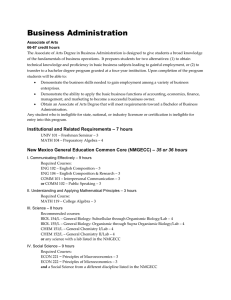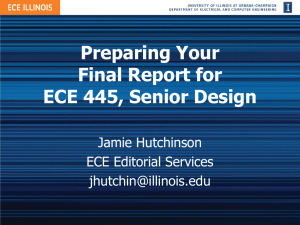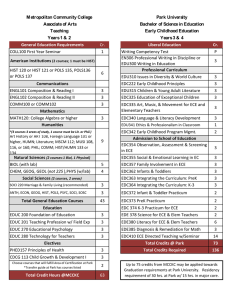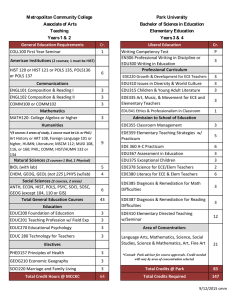Early Care and Education
advertisement
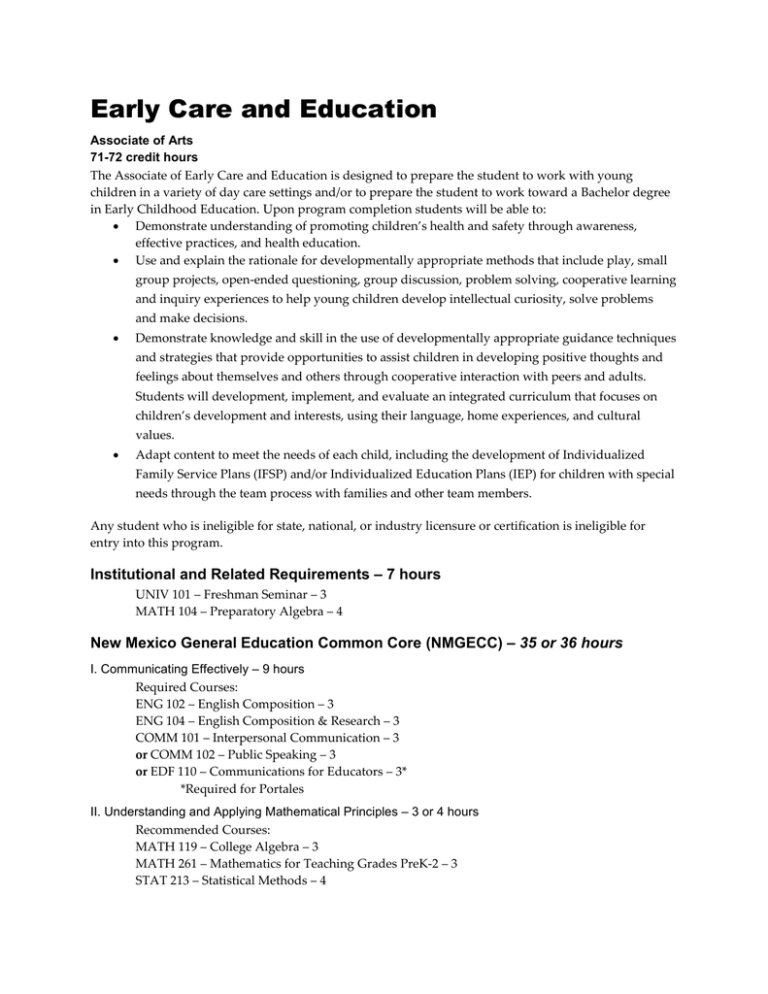
Early Care and Education Associate of Arts 71-72 credit hours The Associate of Early Care and Education is designed to prepare the student to work with young children in a variety of day care settings and/or to prepare the student to work toward a Bachelor degree in Early Childhood Education. Upon program completion students will be able to: Demonstrate understanding of promoting children’s health and safety through awareness, effective practices, and health education. Use and explain the rationale for developmentally appropriate methods that include play, small group projects, open-ended questioning, group discussion, problem solving, cooperative learning and inquiry experiences to help young children develop intellectual curiosity, solve problems and make decisions. Demonstrate knowledge and skill in the use of developmentally appropriate guidance techniques and strategies that provide opportunities to assist children in developing positive thoughts and feelings about themselves and others through cooperative interaction with peers and adults. Students will development, implement, and evaluate an integrated curriculum that focuses on children’s development and interests, using their language, home experiences, and cultural values. Adapt content to meet the needs of each child, including the development of Individualized Family Service Plans (IFSP) and/or Individualized Education Plans (IEP) for children with special needs through the team process with families and other team members. Any student who is ineligible for state, national, or industry licensure or certification is ineligible for entry into this program. Institutional and Related Requirements – 7 hours UNIV 101 – Freshman Seminar – 3 MATH 104 – Preparatory Algebra – 4 New Mexico General Education Common Core (NMGECC) – 35 or 36 hours I. Communicating Effectively – 9 hours Required Courses: ENG 102 – English Composition – 3 ENG 104 – English Composition & Research – 3 COMM 101 – Interpersonal Communication – 3 or COMM 102 – Public Speaking – 3 or EDF 110 – Communications for Educators – 3* *Required for Portales II. Understanding and Applying Mathematical Principles – 3 or 4 hours Recommended Courses: MATH 119 – College Algebra – 3 MATH 261 – Mathematics for Teaching Grades PreK-2 – 3 STAT 213 – Statistical Methods – 4 III. Science – 8 hours Recommended courses: BIOL 154/L – General Biology: Subcellular through Organismic Biology/Lab – 4 BIOL 155/L – General Biology: Organismic through Supra Organismic Biology/Lab – 4 CHEM 151/L – General Chemistry I/Lab – 4 CHEM 152/L – General Chemistry II/Lab – 4 or any science with a lab listed in the NMGECC IV. Social Science – 6 hours Required Course: PSY 201 – Child Psychology – 3 and one course from the following: ECON 221 – Principles of Macroeconomics – 3 ECON 222 – Principles of Microeconomics – 3 PSCI 102 – American National Government – 3 SOC 101 – Introductory Sociology – 3 SOC 212 – Contemporary Social Issues – 3 SOC 215 – Marriage and the Family – 3 V. Fine Arts and Humanities – 9 hours a. Fine Arts – 6 hours Recommended courses: ART 131 – Art Appreciation – 3 MUS 113 – Music Appreciation – 3 THTR 121 – Beginning Acting – 3 or any two Fine Arts courses from different disciplines listed in the NMGECC b. Humanities – 3 hours Required One Course from: HIST 101 – Survey of American History to 1877 – 3 HIST 102 – Survey of American History since 1877 – 3 HIST 121 – Survey of Western Civilization to 1500 – 3 HIST 122 – Survey of Western Civilization since 1500 – 3 HIST 203 – New Mexico – 3 Program Requirements – 29 hours ECE 107 – Health, Safety and Nutrition – 2 ECE 201 – Introduction to Language, Literacy and Reading – 3 ECE 220 – Professionalism in Early Childhood – 2 ECE 239 – Curriculum Development through Play: Birth-PreK – 3 ECE 239 L – Curriculum Development through Play: Practicum – 2 ECE 240/L – Curriculum Development and Implementation: Age 3 through Grade 3/Lab – 5 ECE 265 – Guiding Young Children – 3 ECE 280 – Family and Community Collaboration – 3 FCS 221 – Child Growth, Development and Learning – 3 SPED 203 – Assessment of Children and Evaluation of Programs – 3
